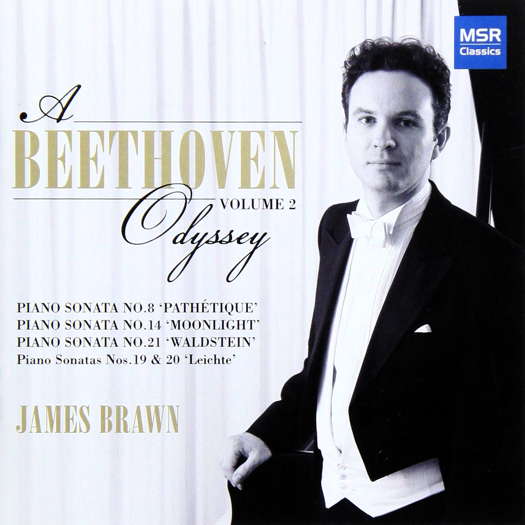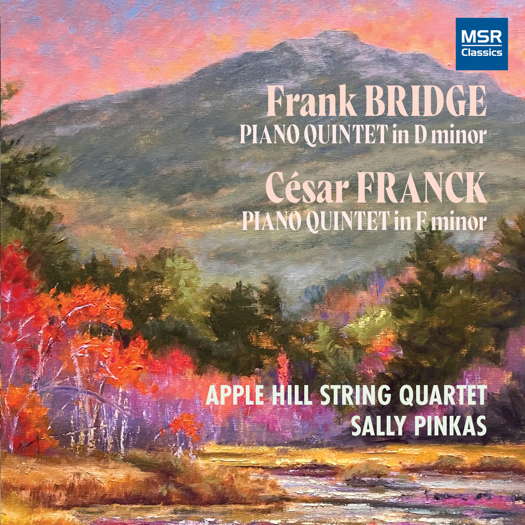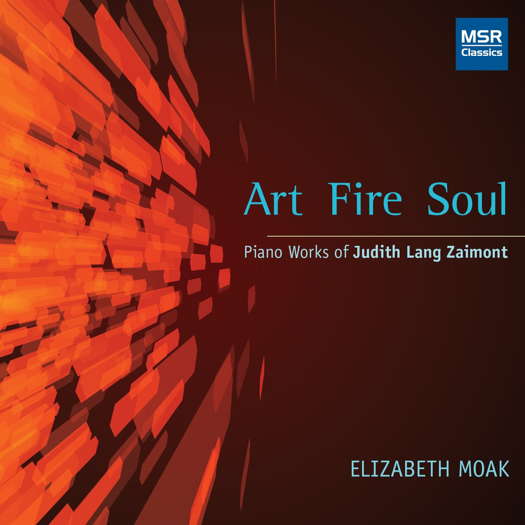 SPONSORED: CD Spotlight. Perfect Indeed - More Beethoven from James Brawn, recommended by Andrew Schartmann.
SPONSORED: CD Spotlight. Perfect Indeed - More Beethoven from James Brawn, recommended by Andrew Schartmann.
All sponsored features >>

Ravishing Music
GEOFF PEARCE reviews works by Bridge and Franck played by Sally Pinkas and the Apple Hill String Quartet
'... an absolutely marvellous performance ...'
I was looking forward to reviewing this recording as both composers and these works, in particular, have long been favourites. Frank Bridge is greatly underestimated, in my opinion, and most often referred to as Benjamin Britten's teacher. Still, he was a fine viola player, composer and conductor and much of his music has received scant recognition. To the composer's frustration, the early works often gain the most attention.
The Piano Quintet in D minor, H 49, was first written in 1905 as a four movement work, but it was later revised as a three movement work, with the composer revising and fusing the old second and third movements. Bridge had not long finished with his studies at the Royal College of Music in London, where his composition professor was Charles Villiers Stanford. At this stage of his life he was influenced by many of the great Romantic composers, but also Fauré and Franck, which I think are the most pervading influences in this work.
The first movement, about twelve minutes in duration and a rather serious affair, is quietly brooding but it is full of melodies and lush harmonies. I can sense that in this work, the composer has an affinity particularly with the brooding eroticism of Franck, particularly with the interesting modulations, and the build-up of tension and release.
Listen — Bridge: Adagio - Allegro moderato (Piano Quintet in D minor)
(MS1815 track 1, 6:23-7:14) ℗ 2025 Apple Hill String Quartet and Sally Pinkas :
The second movement starts with a ravishingly beautiful Adagio which is soulful without being sentimental or trite. This gives way to a fast and playful middle section which reminds me of Mendelssohn at his most playful and requires great agility from the pianist. This does not last, and the serenity of the opening Adagio returns. This truly is ravishing music.
Listen — Bridge: Adagio ma non troppo (Piano Quintet in D minor)
(MS1815 track 2, 7:39-8:24) ℗ 2025 Apple Hill String Quartet and Sally Pinkas :
The final movement is full of fire and cascading piano writing and it has all the volatility and passion of youth. It is the shortest of the three movements, but has varied moods, from stormy and passionate, to calmer and more tender. This movement, more than the other two, projects the way to Bridge's future writing, and I love it for its variety of mood and youthful passion.
Listen — Bridge: Allegro energico (Piano Quintet in D minor)
(MS1815 track 3, 1:45-2:30) ℗ 2025 Apple Hill String Quartet and Sally Pinkas :
The César Franck Piano Quintet in F minor, Op 14 (1879) was the first music by this composer that I ever heard. An elderly woman I helped in her lovely garden was a piano teacher and this work was a favourite of hers. We often listened to it in the late afternoon over sandwiches and tea when the work was done, so it has remained a favourite. It was written at the time when Franck was at the height of his powers. It was also a time when he was falling under the influence of Wagner, and there were also emotional upheavals. Camille Saint-Saëns, the pianist for the first performance, was evidently somewhat overwhelmed.
The first movement is brooding and passionate, and there are moments when I can detect melodies and harmonies that would be used in the later Violin Sonata and the Symphony in D minor.
Listen — Franck: Molto moderato quasi lento - Allegro (Piano Quintet in F minor)
(MS1815 track 4, 10:30-11:08) ℗ 2025 Apple Hill String Quartet & Sally Pinkas :
The second movement is simply gorgeous, and again, I can definitely feel melodic phrases that would be used in the later Sonata for Violin and Piano. Franck is another of those composers that is sadly neglected, but for a handful of pieces.
Listen — Franck: Lento con molto sentimento (Piano Quintet in F minor)
(MS1815 track 5, 2:27-3:19) ℗ 2025 Apple Hill String Quartet and Sally Pinkas :
The final movement is striking with its perpetuum mobile accompaniment, alternating between the strings and the piano, creating considerable tension that only builds to a fever pitch before resolving ravishingly. There are many instances of the build-up of tension, and a palpable release throughout this ten minute movement. Again there are many passages that remind me of those two later works that I have mentioned earlier. It has been many years since I have heard this work, and what a delight this performance is.
Listen — Franck: Allegro non troppo ma con fuoco (Piano Quintet in F minor)
(MS1815 track 6, 4:50-5:41) ℗ 2025 Apple Hill String Quartet and Sally Pinkas :
This is an absolutely marvellous performance, the pianist, Sally Pinkas, being a real class act, a very passionate and musical performer with great technical accomplishment and a wide range of expression. The Apple Hill String Quartet are riveting, and these two works could not receive better champions than the artists here. The attached notes are informative and fairly concise, and the overall effect of this disc reminds me why the piano quintet is probably my favourite genre. Revel in this ravishing music - you will be glad that you did.
Copyright © 10 February 2025
Geoff Pearce,
Sydney, Australia




